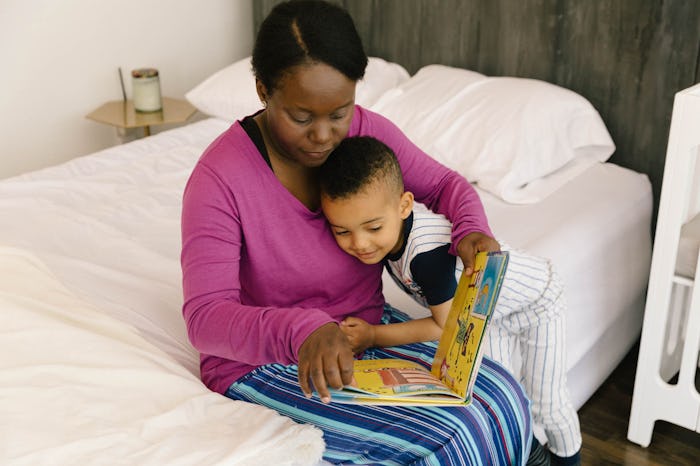Life
These Easy Parenting Habits Can Increase Your Kid's Chance Of Success In School
Parents would do anything for their children, but sometimes, they do too much. From over-scheduling them in extracurriculars to finishing their homework, parents who overstep the mark aren't actually helping their children succeed in school. In fact, parents do far better by their kids when they act as support, and not as white knights and saviors. According to education experts, if you want to know how to help your child succeed in school, you have to start with promoting perseverance and independent problem solving. Basically, if you want your child to succeed in school (and who doesn't?), stop rescuing them.
"Daily habits that support school success are habits that allow children to develop their independence, autonomy skills, and confidence," explains Laura Morgan, Head of School at Stratford School Sunnyvale Washington Park and De Anza Park, located in California, in an email interview with Romper. For Morgan, this could start with giving them more responsibility at home. Setting the table, cleaning their room, and taking out the trash are all daily habits that can help your children feel more competent, and that translates into more confidence at school. "When parents ask for support, I suggest they let their children try to sort out their problems on their own," says Morgan. "I remind them not to rescue their children, but to be there as a sounding board and support system." While you can offer guidance, it's important that children learn to tackle problems on their own.
Say your child is working on a maze and gets stuck. Should you immediately point out the right path to prevent her feeling frustrated? Nope, but you can talk them through the process of solving mazes and brainstorm ways to find a better path. Next time they encounter a similar problem, they'll feel more confident in their ability to problem solve through difficulty. This kind of guidance promotes a growth mindset, which, according to Dr. Carol Dweck, writing for the American Psychological Association, is the understanding that intelligence "can be increased through their own efforts, good strategies, and help from others."
"Start out small with a simple task so children may be successful and build upon a newfound skill," says Morgan of daily tasks and activities. "Praise them for their effort and be specific in your praise around their emerging independence."
As for homework, it should be looked upon as the child's responsibility, and not the parent's, says Morgan. Kids should keep track of their own homework, do their best on each assignment, manage their time to make sure they finish, and "communicate with teachers regarding challenges, planned absences, or if directions are unclear," advises Morgan. Doing all the planning and time management yourself won't actually help your child, as tempting as it may be. Instead, it inadvertently robs them of an opportunity to develop individual responsibility.
However, there are a few things parents can do to support their diligent homeworkers, including ensuring they have a quiet space to work and the necessary materials. "[Parents] can be there as a support system by checking over the homework to make sure it is completed but should refrain from solving the problems," says Morgan. "When a child is struggling to understand the concept, parents should encourage their child to communicate directly with teachers and to be a self-advocate." Indeed, learning to advocate for yourself is an important academic skill in its own right, according to TIME Magazine.
Besides encouraging kids to tackle problems themselves, parents can help their children succeed in school by giving them enough downtime. "So often, children are scheduled with after-school activities, they have little time for themselves," says Morgan. But their development benefits from time to relax, daydream, play, and be at home.
Still, other habits that contribute to academic success are health habits, including adequate sleep and proper nutrition, according to Morgan. So next time you're dying to jump in and solve a problem for your child, consider fixing them a healthy snack instead. Or better yet, setting out the ingredients, and teaching your child to fix the snack themselves.
Check out Romper's new video series, Bearing The Motherload, where disagreeing parents from different sides of an issue sit down with a mediator and talk about how to support (and not judge) each other’s parenting perspectives. New episodes air Mondays on Facebook.
